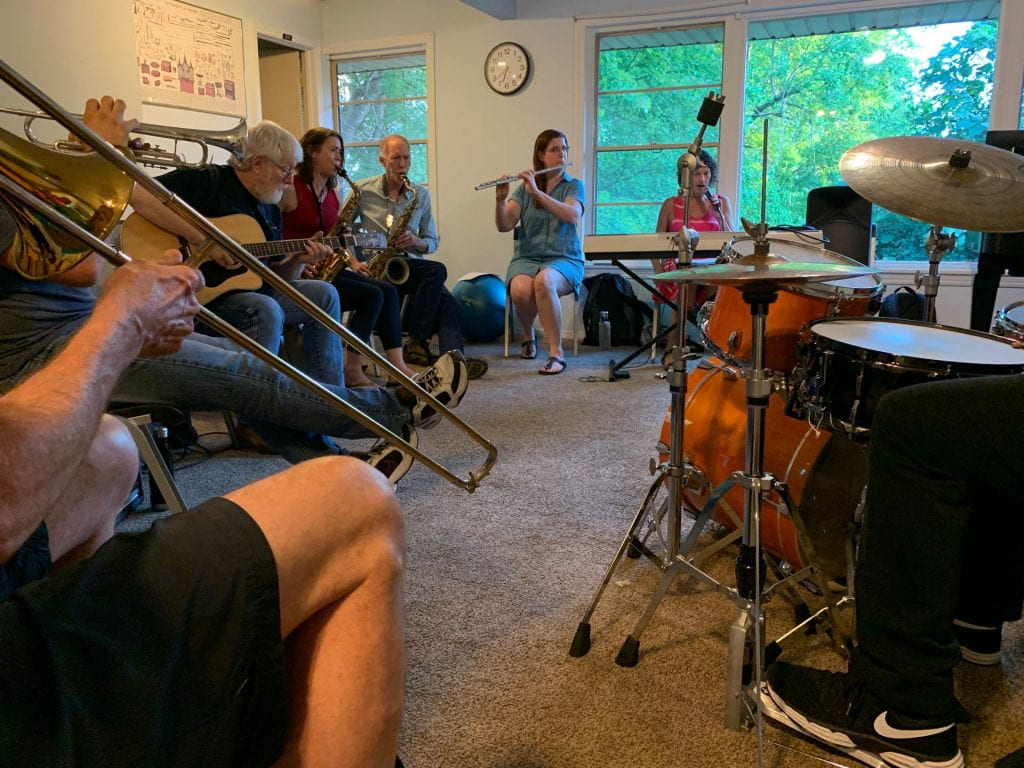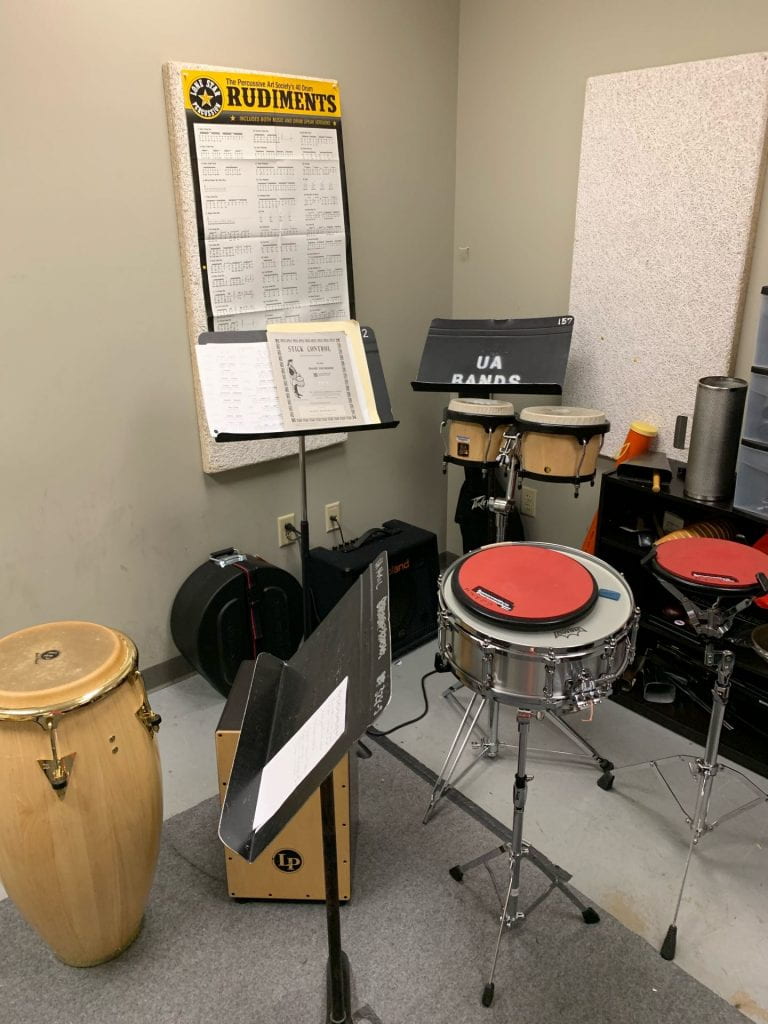Jazz Concentration Adds Gravitas to Department of Music
By Mary Fracchia
The Razorback Reporter
From the dirty, back-alley entrances of New Orleans nightclubs to the pristine and proper soundstage at Lincoln Center, jazz has evolved from background music in brothels into acceptance as America’s classical music. Now jazz is taking its place at the UofA as an academic study, a subject alongside the weighty research of nanotechnology, antiquities and astrophysics.
The university recently established jazz as a course of study, and students can enroll to earn a Bachelor of Music in Performance with a Jazz Studies concentration.

Guitar Instructor Felipe Antonio tunes his guitar in preparation of a lesson with a student in the Billingsley Music Building. (Photo/Mary Fracchia)
The United States has been a cultural melting pot and some artists and musicians say there is no better representation of this diversity than jazz.
“Jazz has a very important place in the history of music and American music, especially in Arkansas. We are sitting in the cradle of American music,” said Jake Hertzog, area jazz coordinator and senior instructor of guitar.
Jazz offers a unique glimpse into American history, coming into being over two world wars and the Great Depression.
“When they study our civilization 2,000 years from now, there will only be three things that Americans will be known for: the Constitution, baseball and jazz music. They’re the three most beautiful things Americans have ever created,” writer and essayist Gerald Early said in an interview from Ken Burns’ award-winning documentary series, Jazz.
Many call jazz America’s classical music. Born in New Orleans, jazz came of age at cozy clubs in Chicago, New York and other big cities. Uptown New York City became the annointed jazz capital of the world.
Chris Teal, a UA adjunct who teaches drum set, jazz improvisation, beginning jazz combo, and popular music, is director of jazz for the UA Community Music school.
“People aren’t going out and listening to Duke Ellington and the Cotton Club,” Teal said. However, there are many artists today whose music is influenced by jazz. Contemporary hip-hop, a pillar of popular music and culture in America, contains elements of jazz. Collaborations of artists such as Kamasi Washington and Robert Glasper with Kendrick Lamar take jazz as a historical concept that “people used to do” and turn it into a process that people bring into music and culture, Teal said.
The UA jazz program allows students interested in performing or composing jazz to be recognized officially as jazz musicians on their diploma, said Joon Park, assistant professor of Music Theory.
“It’s been a program that we’ve wanted to do for a long time,” said Ronda Mains, Music Department chair and flute instructor. “When I first became chair, we tried to get some things going and we just didn’t have the personnel to do it.”
Creating this program shows the importance that jazz has not only to the music department and the UofA as a whole, but also recognizes the important cultural element to the state of Arkansas, Teal said.
The idea for this new concentration, approved in July 2019, started in the 1970s, Hertzog said.

Members of the Community Music School, led by Chris Teal, practice on a Tuesday night at the Suzuki Music School of Arkansas. (Photo/Mary Fracchia)
“At some point in the few years leading up to 2016, the faculty as a whole and the music department thought ‘well maybe we’d like to take those few jazz classes and actually make a jazz degree of some kind,’” Hertzog said.
In 2016, a jazz historian, a jazz theorist, jazz guitarist and saxophonist were brought in by the department and joined a second group to create the eight-person jazz faculty, Mains said.
With the right people for the job, the department began to create the program.
“We worked for three years as a team to do the various levels of the approval process for creating a new degree,” Hertzog said.
The team worked to create the new degree at the university while simultaneously working to have the program recognized nationally.
For the program to comply with the rest of the department, it needed to be accredited, Hertzog said.
“The National Association of Schools of Music is the accrediting body, and they have basically said that our program meets their standards, and thus we are allowed to operate it and most importantly advertise it,” Hertzog said.
This process is something that should have happened a long time ago in order to put the UofA on the same level as other institutions such as the University of North Texas, Teal said.
A program focused on studying jazz is very beneficial to the music department because jazz is “America’s classical music,” Teal said. “I think that it represents such a diverse background and we’re trying to continue that tradition.”
Throughout history, the UofA has hosted famous jazz musicians, including Dizzy Gillespie, Wynton Marsalis and Duke Ellington.

Instruments are set up in Lewis E. Epley Jr. Band Hall at the UofA. (Photo/Mary Fracchia)
Jazz influences an array of styles and genres, as well as different groups of people and social histories, showing that “when you talk about jazz, you actually talk about the entire history of the United States,” Park said.
Jazz also allows musicians considerable flexibility.
“I think the reason we would want to base this out of jazz is that it’s a music that’s really improvisatory,” she said. “It helps students build a lot of skills that they don’t necessarily get from the way classical music is traditionally taught. I think it’s really part of a bigger reconsideration of sort of how Eurocentric traditional ways of teaching not just music, but the arts in general at the college level.”
Jazz opens lots of doors for musicians to be versatile through improvisation while also gaining many of the skills available through a classical concentration, Chris Teal said.
The program is still in its beginning stages, but current students are able to begin enrolling in the classes. It is possible for them to count as prerequisites courses they already have taken that match the concentration track, Hertzog said.
Classes for this new degree include “jazz improvisation, jazz ranging, jazz pedagogy, jazz history, jazz analysis,” Hertzog said.
Besides classes, both music and non-music majors have the opportunity to join various ensembles.
Fernando Valencia is a former member of the UA Latin Jazz Band and he is now coach of the Latin American Ensemble.
Programs like these ensembles allow students go in many different directions, as well as electives that began the jazz program at the UofA, Kimberly Teal said.
These ensembles are open to students of all majors and skill levels.
“I think that whether people know it or not, the sounds and the harmonies and rhythms of jazz are becoming more and more like part of the soundtrack of American music and pop culture again,” Chris Teal said. “It’s sort of like pulling that thread of influence and saying ‘OK what did this person do to get that sound?’ and you’re gonna find more and more they’re getting it from jazz and jazz throughout history.”